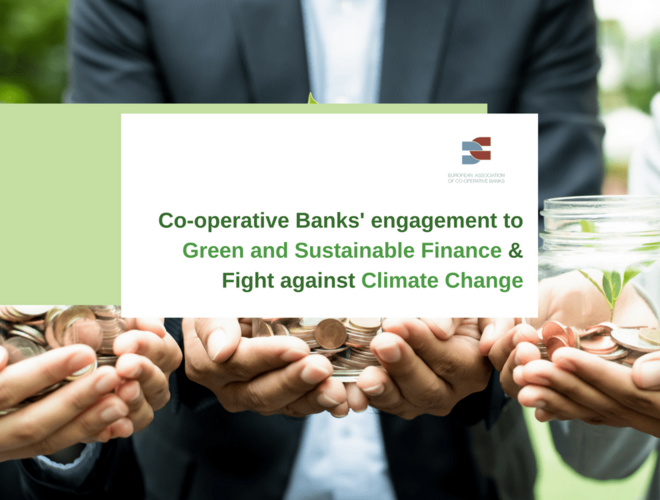Introduction
Fighting global warming is not a theoretical enagagement. It raises the question of a sustainable tranformation of our economic models that must better consider the impact of human activities on the environment in a long-term perspective.
Due to their proximity to members, co-operative banks are fully aware of the challenges and they are already multiplying their efforts for a sutainable economy that respects the environment.
Banking activities take part in this necessary transformation. Retail and proximity banks take an active role in this large scale intitiative, by promoting within their network, the distribution of services and investment or savings products in favour of sustainable development. Moreover in their daily operations, co-operative banks put in place innovative solutions to use in a responsible manner the resources that are indispensable to their activities. This way they also match the aspirations of their employees of being individually engaged towards the planet.
Their branches are active on the national and regional level but also bearing in mind green financing and investing, accompanying energy transition also on the international level.Their expertise in project financing allows the creation of infrastructures that help reducing carbon emissions. Renewable energy represents the core of their new project financing for the energy production. Thanks to their innovating capacity some co-operative banks are relevant finance partners in green bonds, that play a key role in mobilising savings towards responsible projects.
Acting in favour of climate financing is in the very nature of co-operative banks whose mission is to accompany members and clients in the long-term. Due to this engagement in the long-term they call for stability and visibility but also proportionality of the regulatory framework for the banking industry. Additionally, there is a risk that regulation will lead to a less diverse banking environment thus undermining the sustainability and stability of the financial framework in Europe. Those are key issues to address in the debate on sustainable finance. In this light focus shall be on voluntary solutions instead of legislation with the objective of acting collectively in favour of climate.
Co-operative banks are in favour of setting a carbon price that may constitute a strong incentive to investments in low-carbon technologies and in renewable energy. The setting of a price would also allow to measure investments to finance energy transition and facilitate climate financing.
Households, local communities and local enterprises are mobilising to act in favour of climate. Co-operative banks are on their side.
The aim of this publication is to provide selected examples of the engagement of co-operative banks in various countries across Europe.
Table of contents
Introduction
Chapter 1 - Engagement and operational practices: reduction of emissions by members, processes that have positive environmental effects, carbon price.
Chapter 2 - Financing practices: financial products including promotional financing and services oriented to energy efficiency, renewable energy , green bond issues.
Chapter 3 - R&D&I, and other social action initiatives
Other info: data and reporting


